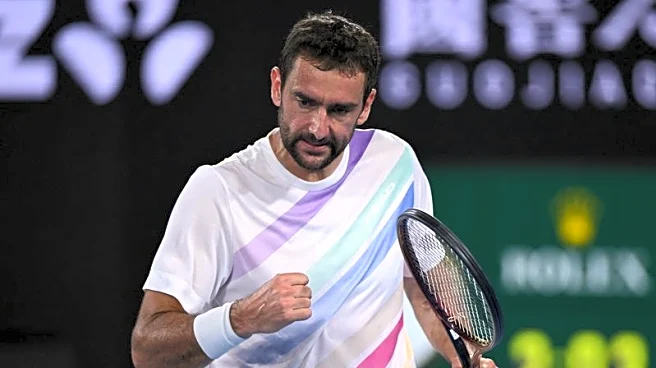What's Happening?
David Ozer, a producer in the entertainment industry, has been sentenced to 18 months in federal custody and ordered to pay $399,000 in restitution. This decision, made by Judge Stanley Blumenfeld on May
6, 2025, follows Ozer's guilty plea in 2024. The case involves fraudulent activities that affected small investors and unpaid crew members, with prosecutors highlighting Ozer's misuse of trust in the industry. The court's ruling aims to compensate some of the victims, although many creditors and freelancers remain uncertain about receiving their dues. The fraudulent schemes reportedly impacted at least two productions and multiple private lenders, leading to significant financial losses for those involved.
Why It's Important?
The ruling against David Ozer is significant as it underscores the legal risks associated with production-account fraud, which is now being treated as a federal wire crime. This case highlights the vulnerabilities in the entertainment industry's financial practices, particularly for small investors who lost life savings and expected executive credits that never materialized. The decision may prompt studios and financiers to implement tighter oversight and stricter escrow protections to prevent similar scams. The case also raises questions about the adequacy of the restitution amount, as many victims still lack clear paths to recover their losses. The outcome could lead to changes in how production contracts are structured and how financial transactions are monitored in the industry.
What's Next?
In response to the Ozer case, there may be increased pressure on financiers and platforms to demand clearer escrow terms, independent audits, and holdbacks for production draws. These measures could create challenges for legitimate startups but are necessary to protect freelancers and small investors. The industry might also see a push towards adopting standardized escrow rules to shield writers, cast, and crew from similar fraudulent activities. As the case continues to unfold, stakeholders in the entertainment industry will likely reassess their vetting processes for producers and the financial safeguards in place to prevent future scams.
Beyond the Headlines
The Ozer case reveals deeper systemic risks within the entertainment industry, where trust-based prepayment for development is vulnerable without proper financial safeguards. The case exposes a pattern of medium-dollar thefts that leave many workers stranded and highlights the need for more robust financial oversight. The reputational capital that Ozer leveraged to mask his criminal activities serves as a reminder of the importance of thorough vetting processes. The industry may need to balance the need for innovation and flexibility with the necessity of protecting stakeholders from financial fraud.











